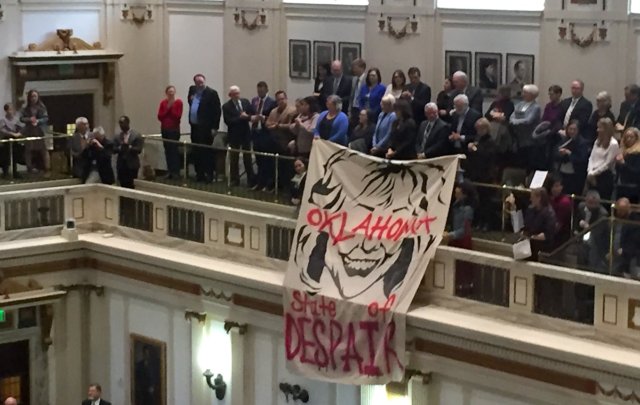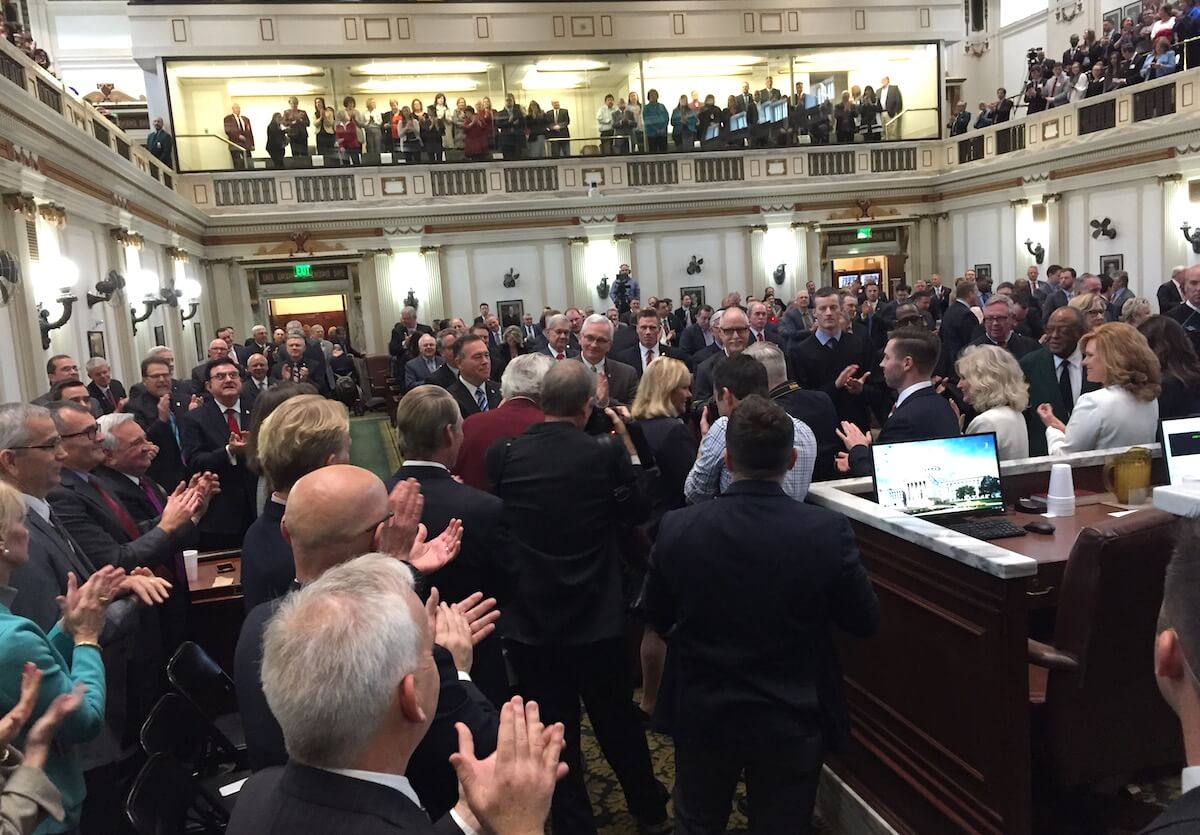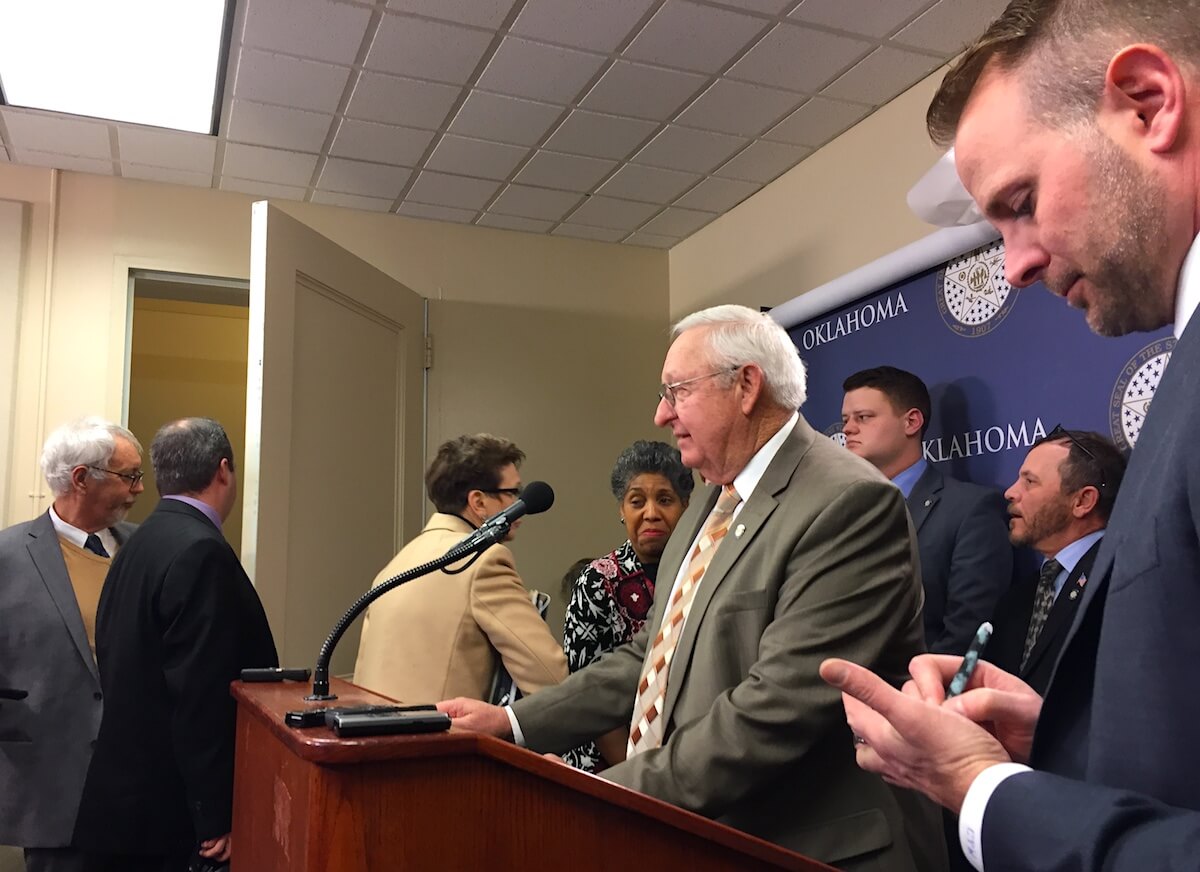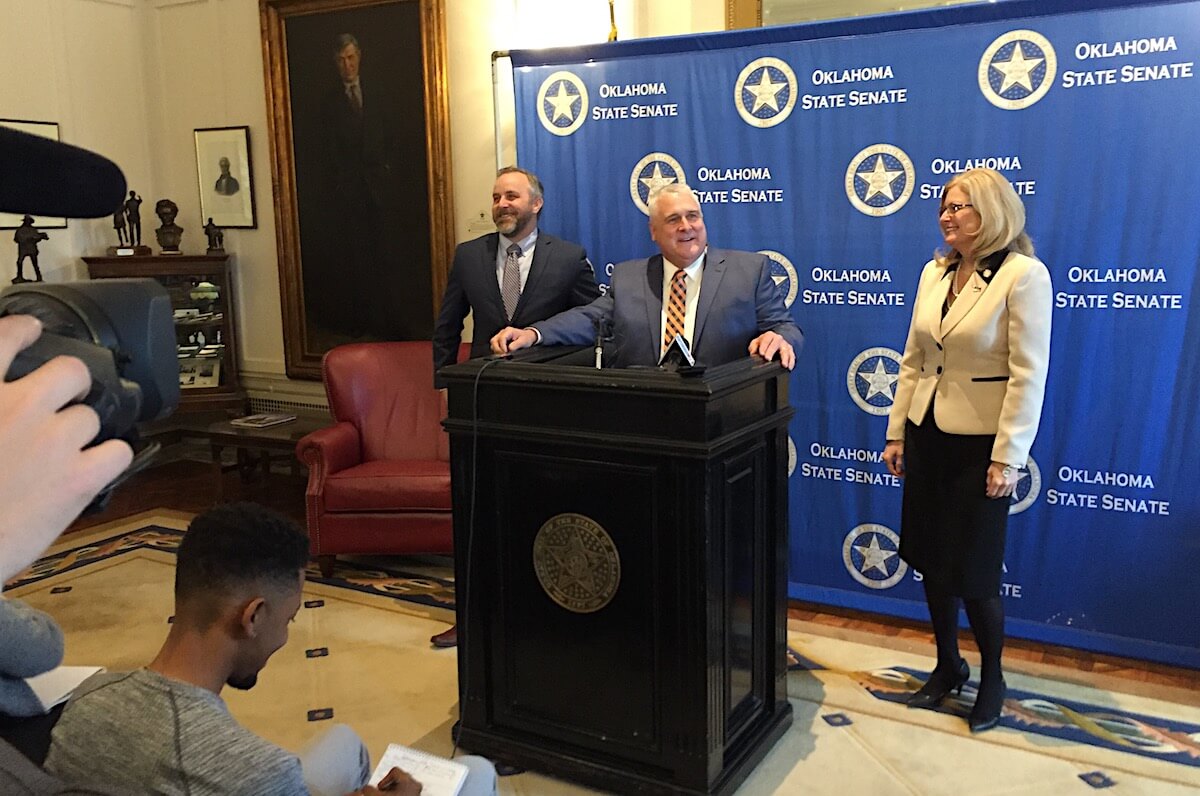

Oklahoma Gov. Mary Fallin concluded her eighth and final State of the State address this afternoon by saying, “Let’s get to work!”
Seconds later, two women unfurled a banner featuring Fallin’s face and the words “Oklahoma State of Despair” over the ledge of the House gallery. A woman in an opposing corner of the gallery began shouting about medical marijuana, a toddler in her arms.
Taken by surprise like everyone else in the crowded chamber, Lt. Gov. Todd Lamb called for the gallery to be cleared, ultimately moving the day’s pomp and circumstance to an end — at least on the House floor.
Throughout the afternoon, media listened to responses from individual caucuses: House Democrats, Senate Republicans and finally Senate Democrats. House Speaker Charles McCall (R-Atoka) did not hold media availability, instead issuing a press release.
Monday’s statements from Fallin and legislative leaders kicked off the 2018 regular legislative session, one the governor called “a historic, defining moment” for Oklahoma.
‘Paralysis and dysfunction are not credible public policies’

Fallin started her speech noting that she did not want to focus on the past, a statement House and Senate Democrats used to critique past tax cuts and budget problems. Fallin, however, emphasized that lawmakers have a hefty responsibility ahead of them with a $244 million budget hole awaiting health agencies for the end of this fiscal year and another budget gap for the next fiscal year starting July 1. She released her constitutionally-required budget proposal Monday as well.
“The budget and the health of our state are not mine to determine,” Fallin said. “Instead, both will be decided by what this Legislature does in the next couple weeks.”
Fallin referenced the Step Up Oklahoma plan by name, saying she supported some parts of it more than others.
“There are not perfect solutions or plans. We know there is no perfect legislation. We also know that compromise is at the very core of the budget on which you will vote,” she said. “It is designed to put our state on a fiscally stable path, bring much needed reform, to give our teachers a $5,000 pay raise and, frankly, to break the gridlock in this building. We don’t want to be like Washington, D.C.”
The governor quoted two of her predecessors who have endorsed the Step Up plan: Democrat George Nigh and Republican Frank Keating.
“Gov. George Nigh said of the Step Up plan, ‘It would help our state break free from the boom-and-bust cycle,'” Fallin quoted. “Gov. Frank Keating said, ‘Paralysis and dysfunction are not credible public policies.'”
‘The plan will get a hearing in the House’
With much of the public and even many lawmakers deriding “dysfunction” by the Legislature in 2017, Fallin and Step Up Oklahoma have put pressure on the body — particularly the House — to pass a plan sooner than later.
“Gov. Fallin outlined our revenue problems and offered several ideas today that many Republicans in the House of Representatives can agree with,” McCall said in his press release. “I share the governor’s belief that Oklahoma citizens want a solution to our budget issues and expect stability in our core government services. A much-needed teacher pay raise is still the top priority for House Republicans, but we need to identify a revenue stream to fund that commitment. The compromise revenue package crafted by the Step Up coalition is a solution. The plan will get a hearing in the House of Representatives, and lawmakers will have an opportunity early in the legislative session to deliver for our citizens.”
But while McCall opted against a Monday press conference, House Democrats gathered to emphasize their interest in supporting the Step Up Oklahoma plan if adjustments are made in terms of income tax, gross production tax and a new proposed tax on the wind industry.

“The Step Up coalition wants Oklahomans to pay more at the pump for gasoline, and the House Democrats are willing to do that if the income tax proposal is truly fair and doesn’t ask more of Oklahomans living paycheck to paycheck,” Rep. Emily Virgin (D-Norman) said. “This caucus’s test for any tax package has always been whether it brings in significant revenue and whether it is fair and equitable for all Oklahomans.”
Virgin said her caucus has sought and continues to support a one-percent-higher hike on the GPT incentive rate to 5 percent, and Rep. David Perryman (D-Chickasha) said oil company requests for a new tax on wind were ironic.
“If the oil and gas industry’s gross production tax was increased to 7 percent, the wind industry would still be paying double in terms of a total tax burden,” Perryman said.
Asked whether she had heard rumors that the Step Up revenue plan might be put up for a vote quickly in an attempt to pressure members who vote against it, Virgin said trying to rush the plan through when votes aren’t there “would be a mistake.”
“I think if they tried to run bills Thursday and then Monday without some sort of compromise with us, I think that would be a mistake,” she said. “There have been some comments about what will happen if we don’t vote for this. Those certainly are not constructive conversations for us.”
‘Things we have already passed out of the Senate’

In his press conference, Senate President Pro Tempore Mike Schulz (R-Altus) said all of the revenue and reform portions of Step Up Oklahoma will originate in the House.
“Most of that Step Up Oklahoma plan are things we have already passed out of the Senate,” Schulz said, noting that the income tax component and the wind production tax are exceptions.
Asked about wind, Schulz said “it blows a lot in southwest Oklahoma.”
“It is a growing industry in Oklahoma. It is one that I think has a bright future in the state of Oklahoma,” Schulz said. “It is one that in recent years that has come under scrutiny because of primarily the tax credit issue that was originally given to help a new industry get established in the state of Oklahoma. We came to a decision a year ago that that industry is probably established, and we ended that tax credit on July 1, 2017.”
He said both wind and oil and gas companies have understandably been frustrated by talk of raising their taxes — although oil and gas associations have endorsed Step Up Oklahoma’s GPT incentive rate increase at 4 percent on all wells.
“Any time you’re talking bout raising someone’s taxes, they’re going to be unhappy,” Schulz said. “But I think both of those two industries have realized they are key to the success of Oklahoma, are important to Oklahoma and want to be a part of solving our budget problems.”
‘The office of the governor deserves more respect than that’
After Schulz spoke, Senate Minority Leader John Sparks (D-Norman) called the Step Up plan “a good starting spot” and critiqued Republican policies of the past decade.
“We’ve finally had a day of reckoning. I appreciate and sympathize with the governor when she said she didn’t want to talk about the past,” Sparks said. “It must be frustrating to pursue the policies they have pursued over these years and to have them fail.”
He said he does not believe lawmakers will “rubber stamp” the proposals just because they come from business leaders.
“They’re the same people who’ve showed up and said, ‘Hey we’ve got some more great ideas, no negotiation, take it or leave it, and do it on our time frame,'” Sparks said. “There are some of us who are a little cautious to rubber stamp these bad ideas from the same people whose bad ideas got us here.”
Sparks did provide details of the Step Up Oklahoma’s long-term savings reform, which he said will be in a bill carried by McCall and himself. He said 5 percent of gross production taxes would be placed into an investment fund with 4 percent of the principal being moved yearly into the general revenue fund.
“Just about every oil and gas state in the country and many countries in the world have this same kind of long-term savings account, except Oklahoma,” Sparks said. “If we had done this starting in the 20s, we would be in a much different place. That one seems to have bipartisan support, and maybe we can get it through quickly and show some momentum.”
At the end of his press conference, Sparks offered criticism for the people who disrupted Fallin’s State of the State speech earlier in the day.
“It was rude and undermined the credibility of the messages those individuals were trying to convey,” Sparks said. “It doesn’t matter how noble your cause is, when you go about it in that way, you take a step backwards.”
“The office of the governor deserves more respect than that.”




















